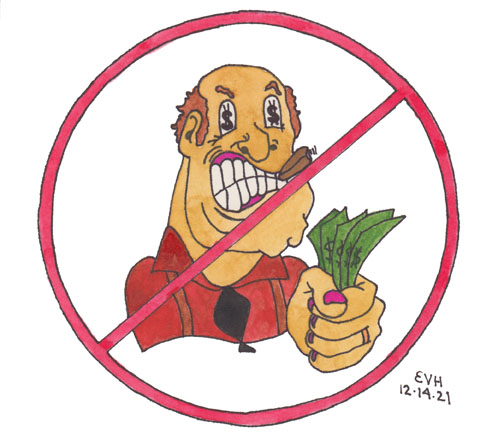
Jataka 287
Lābha Garaha Jātaka
Dispraise of Gain
as told by Eric Van Horn
originally translated by William Henry Denham Rouse, Cambridge University
originally edited by Professor Edward Byles Cowell, Cambridge University
This story takes one of the Buddha’s teachings and carries it well beyond what he intended. It is true that the Buddha declared the holy life to be superior to the worldly life, but he never went to the extremes found in this story. This Jātaka makes it sound like all ways of earning a living are evil, and that is most certainly not in the Buddha’s Dharma. One of the Buddha’s most important supporters was Anāthapiṇḍika, who was probably the wealthiest man in India at that time.
“He who has madness.” The Master told this story at Jetavana. It is about a fellow monk of the Elder Sāriputta. This brother came and greeted the Elder, and sitting on one side, he asked him to tell the way in which one could get material possessions, and how he could get fine clothing and the like. The Elder replied, “Friend, there are four qualities which make a man successful in getting wealth. He must get rid of modesty from his heart. He must resign from the Saṇgha. He must seem to be mad even if he is not. He must speak slander. He must behave like a deceiver. He must use unkind words everywhere.” Thus he explained how a man gains material wealth. The monk rejected this way of living and went away.
The Elder went to his Master and told him about it. The Master said, “This is not the first time that this brother spoke in disapproval of gain. He did the same before.” And then, at the request of the Elder, he told him this story from the past.
Once upon a time, when Brahmadatta was the King of Benares, the Bodhisatta was born into a brahmin family. When he came of age at sixteen years, he had already mastered the three Vedas and the 18 accomplishments (also called the 18 vidhyasthanams). He became a widely renowned teacher. He taught a body of 500 young men. One young man, a youth of virtuous life, approached his teacher one day with the question, “How is it these people gain material wealth?”
The teacher answered, “My son, there are four qualities which gain riches for those people.” And he repeated the first stanza:
“He who has madness, he that slanders well,
Who has an actor’s tricks, ill tales do tell,
Such is the man that wins prosperity.
Where all are fools, let this your maxim be.”
The pupil, on hearing his master’s words, expressed his disapproval of gaining material wealth in the two following stanzas:
“Shame upon him that gain or glory wins
By dire destruction and by wicked sins.
“With bowl in hand a homeless life I’ll lead
Rather than live in wickedness and greed.”

Figure: Greed is not good.
Thus did the youth praise the quality of the holy life. He immediately became a recluse and craved alms with righteousness. He cultivated the Attainments (jhānas) until he became destined to be reborn in Brahma’s world.
When the Master ended this discourse he identified the birth: “At that time the brother who disapproved of gain was the young man, and I was his teacher.”
